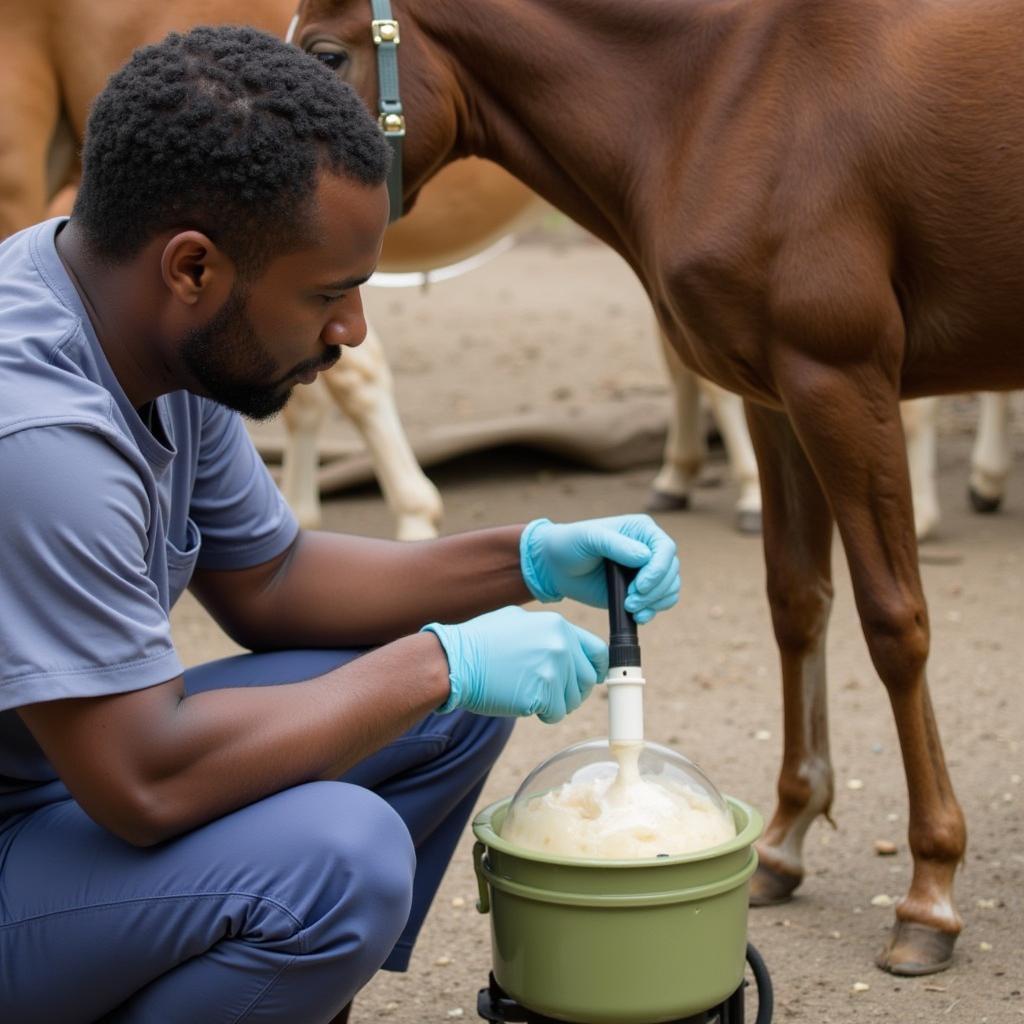Colostrum is the first milk produced by mares after giving birth, and it’s crucial for a newborn foal’s health and well-being. Packed with essential nutrients, antibodies, and growth factors, colostrum provides passive immunity and sets the stage for a strong immune system in those critical first hours and days of life.
Understanding the Importance of Colostrum
Unlike humans, foals are born with a naive immune system, meaning they lack the antibodies needed to fight off infections. This makes colostrum, a thick, yellowish milk, a life-saving elixir. It contains high concentrations of immunoglobulins, primarily IgG (immunoglobulin G), which act like pre-programmed defenders against pathogens the mare has encountered in her environment.
 A veterinarian assisting with colostrum collection from a mare
A veterinarian assisting with colostrum collection from a mare
Beyond immunity, colostrum is a powerhouse of nutrition. It’s richer than regular mare’s milk in proteins, vitamins (A, D, and E), minerals, and energy, providing a vital boost for the foal’s growth and development. It also contains growth factors that stimulate cell growth and repair, aiding in the rapid maturation of the foal’s organs.
Recognizing Failure of Passive Transfer (FPT)
Failure of Passive Transfer (FPT) occurs when a foal doesn’t receive or absorb enough colostrum, leaving them vulnerable to infections. This can happen due to various reasons, including:
- Premature lactation: The mare might leak colostrum before foaling, reducing the amount available to the foal.
- Difficult birth: A prolonged or complicated delivery can delay the foal’s ability to stand and nurse, limiting colostrum intake.
- Poor quality colostrum: The mare’s colostrum might have low antibody levels, making it less effective.
- Foal factors: A weak, sick, or premature foal may struggle to nurse effectively.
Recognizing the signs of FPT is crucial for early intervention. Be vigilant for these symptoms in your foal:
- Lethargy and weakness
- Reduced suckle reflex
- Diarrhea
- Fever
- Increased respiratory rate
- Swollen joints
If you suspect FPT, contact your veterinarian immediately. A blood test can determine the foal’s immunoglobulin levels, confirming the diagnosis.
Ensuring Adequate Colostrum Intake
Maximizing a foal’s colostrum intake is paramount to its survival and long-term health. Here are key steps to ensure successful passive transfer:
- Monitor the mare: Watch for signs of impending foaling and check for premature lactation.
- Assist with nursing: Encourage the foal to nurse within the first hour after birth. If the foal is weak or unable to stand, assist by milking the mare and bottle-feeding the colostrum.
- Timely intervention: If there’s any concern about colostrum intake or quality, consult your veterinarian. They might recommend supplementing with colostrum from a bank or administering plasma transfusions.
 A newborn foal nursing from its mother
A newborn foal nursing from its mother
Colostrum Management and Alternatives
Proper colostrum management is essential for providing a safety net for foals who might not receive enough naturally. Consider these strategies:
- Colostrum banking: Freezing colostrum from healthy mares can provide a readily available backup source.
- Colostrum replacers: Commercial colostrum supplements are available but should be used under veterinary guidance.
- Plasma transfusions: In severe cases of FPT, intravenous plasma transfusions can provide immediate antibody support.
Beyond Colostrum: Supporting the Newborn Foal
While colostrum is paramount, a multifaceted approach to foal care is essential. This includes:
- Providing a clean and safe environment: A dry, well-ventilated stall minimizes the risk of infection.
- Monitoring vital signs: Regularly check the foal’s temperature, heart rate, and respiration to detect early signs of illness.
- Vaccinating the mare: Ensuring the mare is up-to-date on vaccinations helps protect the foal through her milk.
Colostrum is nature’s gift to newborn foals, a powerful elixir that sets the foundation for a healthy life. Understanding its importance, recognizing the signs of FPT, and taking proactive steps to ensure adequate intake are vital for every horse owner welcoming a new foal into the world.
FAQs about Colostrum for Horses
Q: How much colostrum does a foal need?
A: Ideally, a foal should consume 10-20% of its body weight in colostrum within the first 12 hours of life.
Q: Can I give cow colostrum to a foal?
A: While cow colostrum contains antibodies, it’s not ideal for foals. Mare colostrum is species-specific and provides the best protection.
Q: How long can I store frozen colostrum?
A: Frozen colostrum can be stored for up to a year.
Q: When can I switch a foal to regular mare’s milk?
A: Once a foal is 12-24 hours old and has received adequate colostrum, it can transition to regular mare’s milk.
Q: What are the long-term effects of FPT?
A: Foals that experience FPT are more susceptible to infections and may have lifelong health challenges.
Need More Information?
For further insights into horse breeding and foaling, explore these resources:
For personalized advice and support, don’t hesitate to contact our team at Justus Horses USA. Call us at 0772127271, email us at [email protected], or visit us at QGM2+WX2, Vị Trung, Vị Thuỷ, Hậu Giang, Việt Nam. We’re here to assist you 24/7.